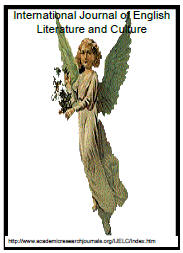| IJELC |
International
Journal of English Literature and Culture |
||||||||||||||||||||
|
International Journal of English Literature and Culture Vol. 3(4), pp. 96-106, April, 2015 ISSN: 2360-7831 DOI: 10.14662/IJELC2014.083 Review Paper “Words Made Flesh” A Formalist Reading of Helon Habila’s Waiting for an Angel
*1Asika, Ikechukwu Emmanuel, 2Ifechelobi, Jane Nkechi and 3Akabuike Ifeoma Grace
1Department of English, Anambra State University, Igbariam. Email: asikaikechukwu@yahoo.com. 2Department of English, Nnamdi Azikiwe University, Awka. 3Department of English, Anambra State University. Igbariam. E-mail: Ifyakabuike2014@gmail.com
Accepted 27 April 2015
Formalism is
one of the literary approaches of the twentieth century. It is a
critical approach that emphasizes on a close reading of a text, the
literariness of a text and not on something external. The approach
demands for a close reading of a text and it is interested and appeals
to the highest points and factors that make a work of art ’literary’ in
all ramification. Formalism provides for a reader, a way to understand
and enjoy a work for its own inherent value as a piece of literary art.
This approach emphasizes on close reading of a text in order to decipher
the literariness of the work and nothing more. By emphasizing on close
reading of a text itself, formalist critics place all attention and
focus on the text as literature. A literary work from the view point of
formalist critics is a piece on its own which is capable of its own
meaning and significance in isolation of the society and several social
issues that may have given birth to the work of art. This paper attempts
a formalist reading of Helon Habila’s Waiting for an Angel. The idea is
to enquire on the literariness of the work and to highlight on the
peculiar parts ranging from the narrative techniques, diction, point of
view and other intricate elements that make the novel an interesting
literary piece. The paper concludes on how these techniques were richly
harnessed and explored by the writer and how they combined effectively
to contribute to the success of the literary piece and how these
elements serve as keys to unlocking hidden textual meanings in the
novel. Cite This Article As: Asika IE, Ifechelobi JN, Akabuike IG (2015). “Words Made Flesh” A Formalist Reading of Helon Habila’s Waiting for an Angel. Inter. J. Eng. Lit. Cult. 3(4): 96-106
|
|||||||||||||||||||||
|
|
||||||||||||||||||||
